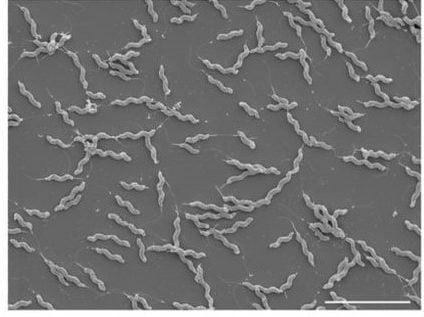Interesting Science Videos
Biochemical Test of Campylobacter jejuni
| Basic Characteristics | Properties (Campylobacter jejuni) |
| Capsule | Capsulated |
| Catalase | Positive (+ve) |
| Flagella | Flagellated |
| Gram Staining | Negative (-ve) |
| Growth at 25°C | Negative (-ve) |
| Growth at 37°C | Positive (+ve) |
| Growth at 42°C | Positive (+ve) |
| Growth on MacConkey Agar | Positive (+ve) |
| H2S | Negative (-ve) |
| Hemolysis | Non-Hemolytic |
| KOH | Positive (+ve) |
| Motility | Motile |
| Nitrate Reduction | Positive (+ve) |
| Nitrite Reduction | Negative (-ve) |
| OF (Oxidative-Fermentative) | Non-Fermentative |
| Oxidase | Positive (+ve) |
| Resistance to cephalothin | Positive (+ve) |
| Resistance to nalidixic acid | Negative (-ve) |
| Shape | Comma/S-Shaped/Coccoid/Rods |
| Spore | Non-Sporing |
| Urease | Negative (-ve) |
Fermentation of |
|
| DNase | Negative (-ve) |
| Glucose | Negative (-ve) |
Enzymatic Reactions (Hydrolysis) |
|
| Alkaline Phosphatase | Variable |
| Arylsulphatase | Negative (-ve) |
| Hippurate | Positive (+ve) |
| Indoxyl Acetate | Positive (+ve) |
| Tween 40 | Positive (+ve) |
| Tween 60 | Positive (+ve) |
| Tween 80 | Negative (-ve) |
Figure: Scanning electron micrograph of the spiral shape and flagella of Campylobacter jejuni


Nice work. What is your scientific source for these test results?